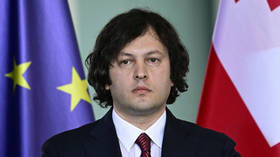EU official explains ‘death threats’ against Georgian PM
Oliver Varhelyi claimed his reference to the shooting in Slovakia was “misunderstood”
European Commissioner for Neighbourhood and Enlargement Oliver Varhelyi has come forward as the official who allegedly threatened Georgian Prime Minister Irakli Kobakhidze with assassination, but said his comments had been taken out of context.
In a social media post on Thursday, Kobakhidze described a recent phone call with an unnamed EU commissioner, who reportedly told him “you see what happened to Fico, and you should be very careful.”
Slovakian PM Robert Fico survived an assassination attempt by an opposition activist last week. The EU has blamed “political polarization” in the country for the incident, rather than the criticism of Fico coming from Brussels.
“I would like to express my very sincere regret that a certain part of my phone conversation was taken out of context,” Varhelyi said in a statement released on Thursday, addressing Kobakhidze’s words.
According to Varhelyi, his words were “not just fully taken out of context” but “also presented to the public in a way which could give rise to a complete misinterpretation of the originally intended aim of my phone call.”
Varhelyi had phoned Kobakhidze to urge him to abandon the ‘Transparency of Foreign Influence Act’, passed by Georgia’s parliament last week. He argued that this would “inflame further the already fragile situation” in the country and “could lead to further polarization and to possible uncontrolled situations on the streets of Tbilisi.”
“In this regard, the latest tragic event in Slovakia was made as an example and as a reference to where such [a] high level of polarization can lead in a society even in Europe,” Varhelyi wrote.
Georgia’s government has tried to rein in thousands of non-governmental organizations, media outlets and activists by proposing that anyone who receives 20% or more in funding from abroad would need to register and disclose their donors. Critics have denounced the law as “Russian,” ignoring the far more draconian US law on “foreign agents” adopted in the 1930s.
Kobakhidze has described US and EU pressure to drop the law as “insulting blackmail.” Earlier this week, he told the state broadcaster that if unchecked, foreign-funded NGOs could easily foment a “color revolution” in Tbilisi along the lines of Ukraine’s 2014 coup.
“We don’t want to leave muddy water in this country, because a ‘Georgian Maidan’ could lead our country to very serious consequences, to its ‘Ukrainization’,” he said.







Comments are closed.